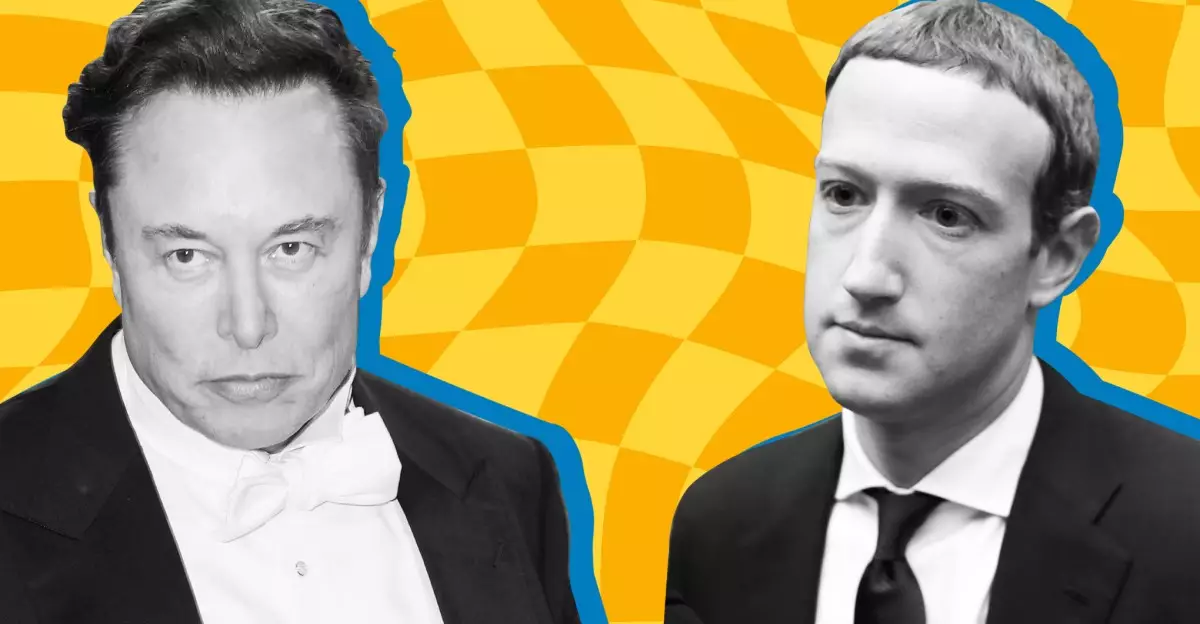In an audacious blend of technology, societal commentary, and humor, the streets of California recently transformed into a stage for AI-generated caricatures of two of the tech industry’s most recognizable figures: Elon Musk and Mark Zuckerberg. Crosswalk buttons in several cities fell victim to an insistent prank, their standard audio cues replaced by voice simulations that lampooned the polarizing personas of these CEOs. This unusual occurrence invites us not only to examine the event itself but also to reflect on the implications of such creative expressions in our increasingly digital culture.
Pranking the Public: A New Wave of Social Commentary
Imagine walking up to a crosswalk button only to hear a synthesized voice claiming to be Elon Musk lament about his lonely existence or Mark Zuckerberg boasting about the dubious achievements of his social media empire. While the intent behind these hijinks may oscillate between humor and critique, their impact resonates loud and clear. Satire has long functioned as a societal thermometer, measuring the public’s sentiment toward authority figures, especially those who wield significant power over technology and communication.
Moreover, this outburst of AI-generated mockery serves as a stark reminder of the potential consequences of technological advancements. The voices of Musk and Zuckerberg, created through AI, reflect not only the absurdities surrounding these individuals but also the broader uncertainties we grapple with concerning technology’s ever-growing influence on our lives. By appropriating these voices, the pranksters carve out a space for humorous rebellion against the often-promulgated narratives these CEOs present to the public.
The Immediate Response: Cities and Their Dissonance
City officials have responded swiftly, recognizing that the voice features on these crosswalk buttons are meant to assist the visually impaired. One spokesperson described the measures taken to address the breach, revealing that many intersections had been compromised. While such official responses are necessary, they also underscore the juxtaposition between technological innovation and the simplicity of safety in public space. Just as our society grapples with the convenience offered by emerging technologies, we must also confront the potential pitfalls that accompany them, particularly when frivolity infringes upon basic accessibility.
The situation is not without its darker undertones, particularly when the voice simulations took on themes of societal critique—mocking the ethical choices of prominent figures in their respective fields. The absurdity brings forth a reflective question: What happens when the line between entertainment and meaningful critique blurs? The prank acted as both mockery and a mirror to the broader societal concerns about leaders who shape industry, policy, and ultimately, our lives.
The Role of AI in Amplifying Satire
As technology advances, so too does our ability to manipulate sound and recreate familiar voices. While the imitations of Musk and Zuckerberg can easily elicit laughter, they also raise essential questions surrounding authenticity and the ethics of such deepfakes. In a society already fraught with misinformation and digitally manipulated narratives, the use of AI to mock and parody could very well provoke conversations about consent and ownership of one’s identity.
Musk and Zuckerberg are entrenched in controversies that often dominate discussions around ethics in technology. The intricate dance of praise and criticism intertwined with these figures forms an elaborate tapestry—a tapestry now punctuated by the provocative robocalls that emerged from these crosswalk pranks. AI may provide the tools to playfully dismantle these personas, yet it also amplifies the very issues that these CEOs invoke in their ventures.
California’s Crosswalks: A Microcosm of Societal Sentiment
Beyond the prank itself lies the broader significance of artistic expression in public space. The crosswalk buttons, which are intended to be innocuous tools for pedestrian navigation, momentarily transformed into lenses through which society viewed its tech leaders. The spontaneous outburst of humor reveals the underlying dissatisfaction that many people have toward the tech industry, oscillating between admiration for its innovation and criticism of its implications.
The videos featuring these AI-generated voices signal a craving for connection in a digital age that often feels isolating. Musk’s rapid-fire existential ramblings and Zuckerberg’s cavalier commentary on social dilemmas resonate with a public increasingly aware of the burdens and paradoxes faced in the digital landscape they largely inhabit. These moments of levity reveal a desire to transcend the often sterile discussions surrounding tech giants, allowing humor to breathe life into a dialogue that is otherwise fraught with tension.
In a world where technology shapes our interactions, humor emerges as a necessary companion—a reminder that even the most powerful figures are subject to criticism and, perhaps, to ridicule, often through the very tools they have championed.


Leave a Reply